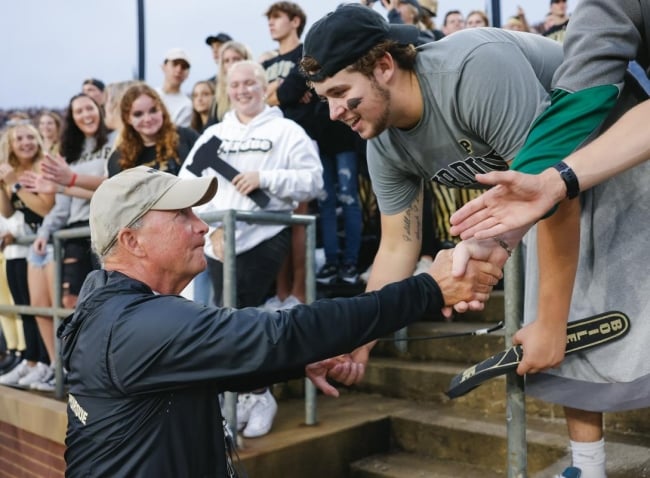You have /5 articles left.
Sign up for a free account or log in.

Mitch Daniels, who led Purdue for a decade, will retire at the end of 2022.
Michael Hickey/Getty Images Sport
Mitch Daniels is stepping down after 10 years as president of Purdue University, per an announcement made Friday. And a successor was named on the same day—without public input.
Purdue did not respond to a media inquiry about the closed internal search process, which breaks from the norm at public universities when seeking a successor for a departing president.
Daniels, a former Indiana governor from 2005 to 2013, joined Purdue in 2013 after his term ended. Daniels will vacate the president’s office at the end of the year and be replaced on Jan. 1 by Mung Chiang, who currently serves as dean of engineering and executive vice president for strategic initiatives.
Last year Chiang was considered to be the front-runner for the University of South Carolina presidency before dropping out of consideration, citing responsibilities to his family and Purdue.
The Hire
Once Daniels made his interest in retiring clear to the board, an internal search for his successor began, according to details shared with local reporters at Friday’s Board of Trustees meeting, where the announcement was made. Other internal candidates were also considered. Chiang said at Friday’s meeting that he was first approached about the presidency in April.
Chiang was the unanimous choice to succeed Daniels, according to a Purdue news release in which Board of Trustees chairman Michael Berghoff noted Chiang had turned down other offers.
“He has displayed not only academic excellence but also administrative acumen, effective relationship-building with academic, governmental, and business partners, and the skills of public communications,” Berghoff said in the news release announcing the hire. “He brings the entire package of talents and experience necessary to take our university further forward. It is no surprise that Mung has been offered the presidency of several other schools, and the board is grateful that his loyalty to Purdue kept him here and available as this time of transition arrived.”
Before Purdue, Chiang spent almost 14 years in various roles at Princeton University. Chiang completed his undergraduate education, master’s degree and Ph.D. at Stanford University.
Purdue made the hire after an internal search.
“The Board of Trustees is empowered by statute and bylaw to screen and select the president of Purdue University by whichever process they deem appropriate. In this case, it was decided that there were enough qualified internal candidates to fill the position without an external search. Therefore, the board members have been informally gathering feedback and input on the candidates of interest, and announced their selection on Friday, June 10,” Colleen Brady, chair of Purdue’s University Senate said by email.
The Reactions
Across Indiana, public officials praised the work Daniels has done and celebrated the new hire.
“During his 10 years at the helm, Mitch has delivered higher education at the highest proven value, from freezing tuition during his entire tenure, to creating a national online university, establishing a network of Indiana STEM charter schools, and making record investments in world-class research,” Indiana governor Eric Holcomb said in a statement Friday. “He has always kept Purdue’s land-grant mission as its core strategy and spent each day opening the doors of higher education to every Hoosier willing to put in the work to be a Boilermaker.”
Holcomb added that he is “eager to work with Dr. Mung Chiang as he takes the reins.”
Pamela Whitten, president of Indiana University, also paid respect to Daniels.
“Congratulations to Mitch Daniels on his great success in leading Purdue. He is a highly valued colleague; we wish him the best. Congratulations also to Dr. Mung Chiang on being named president of Purdue University,” Whitten tweeted Friday. “I look forward to making progress toward our shared goals of student success, research and strengthening the state.”
Some higher education observers found the move puzzling because of how the search was carried out in a secret fashion, with both the retirement of Daniels and his successor named on the same day, noting that the process used at Purdue breaks from the norm at public institutions.
“To my knowledge, this is a very unusual arrangement for a public institution,” said Neal Hutchens, a professor at the University of Mississippi who studies legal issues in higher education.
While Hutchens said some states have dialed down transparency in searches, limiting the number of candidates revealed as finalists, Purdue’s approach here is atypical of the presidential hiring process.
“I don’t understand the advantages of doing it this way. To me, it would seem to shut down transparency and the ability to get feedback from different constituencies across campus,” Hutchens said.
David Sanders, a professor at Purdue, told local TV station WLFI that the surprise hire limited the ability of the university to properly vet Chiang as he steps into the role of the president.
“We can’t guarantee we had the best outcome without knowing if it was an open process,” Sanders told the TV station Friday. “There had been other examples at other universities where they engaged in this closed process, and it turned out if there had been an open process, information about the appointee would have come out. And they wouldn’t have been considered. They wound up having to fire, or the person has moved on because they weren’t vetted appropriately, which would have happened better if it had been an open process.”
Daniels leaves a legacy at Purdue that has seen him both celebrated and castigated. He has earned praise for an 11-year tuition freeze, developing corporate partnerships and growing the student body, among other accomplishments. At the same time, Daniels has been criticized for expanding Purdue’s online offerings by acquiring the troubled for-profit Kaplan University, and foot-in-mouth missteps when commenting on Black scholars and student gender gaps.
Daniels told reporters at Friday’s meeting that he is not weighing other job offers and does not have immediate plans following his departure from Purdue at the end of this year.
Daniels joins a number of other high-profile college presidents who have announced plans to retire in recent months, including, most recently, Lawrence S. Bacow at Harvard University.




